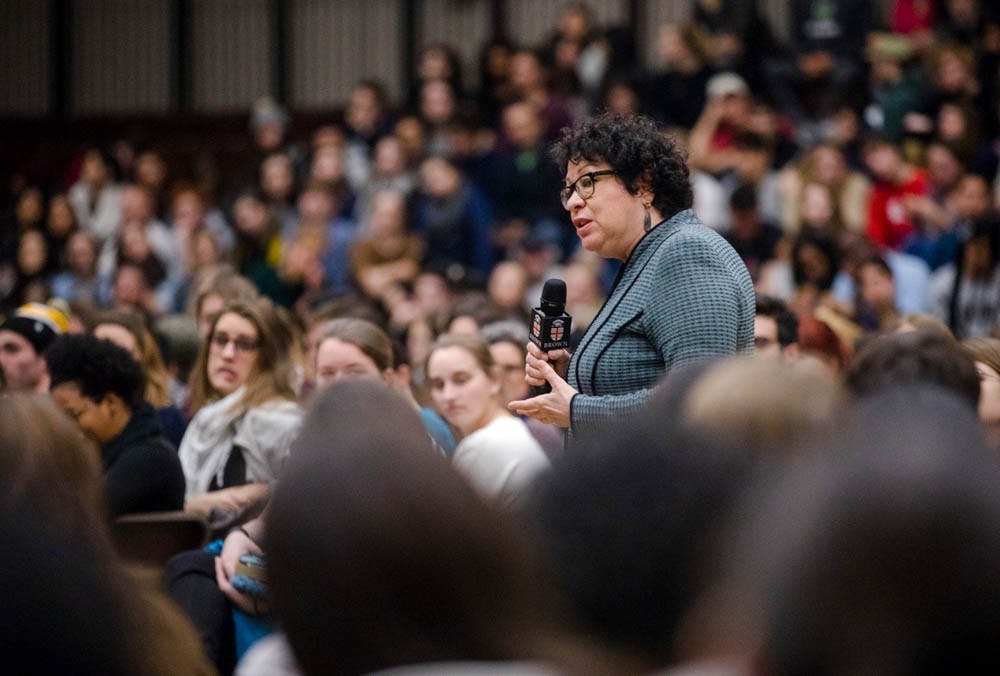It was one standing ovation after another as the campus welcomed U.S. Supreme Court Justice Sonia Sotomayor to speak in a conversation moderated by President Christina Paxson P’19 Wednesday afternoon.
Addressing a packed audience in the Pizzitola Center, Sotomayor touched on a variety of topics ranging from her experiences as a first-generation college student to the importance of understanding different perspectives.
Sotomayor began by emphasizing how she maintains a sense of relativity when facing hardships. After being diagnosed with diabetes at a young age, she struggled to balance her condition with her everyday life. But it wasn’t until she noticed her cousin — who had a non-functional arm — that she came to recognize others’ experiences with hardships.
“As sorry as I felt for myself, … someone would be dealing with something that was more serious and more life-impacting than my condition,” Sotomayor said. “You need that sense of proportionality to remember that no matter how hard things are, they’re harder for other people. If you stick to it, you can find ways around them,” Sotomayor added.
Throughout the conversation, Sotomayor and Paxson drew examples from Sotomayor’s memoir, “My Beloved World,” which members of the class of 2020 read as part of the University’s First Reading program.
The memoir was a key inspiration for Ana Sofía Velázquez ’20, who introduced the conversation. Velázquez said she felt personally connected to Sotomayor because she, too, is from Puerto Rico, and she described the “special spark” alive in their shared culture and college experience.
“Having her book as our First Reading encouraged me go to college with an open mind, ready to overcome any struggle that came my way so I could achieve my goals, and so I could beat the odds, as Justice Sotomayor did,” Velázquez said.
As a first-generation college student, Sotomayor had no point of reference for many stages in her life, she said. “If you don’t come from a background that can explain the markers of life — the markers of success — then you don’t really know how to aspire to success.” In spite of the lack of reference points, she attended Princeton just three years after it began accepting women into the university, and went on to graduate summa cum laude before going on to earn her law degree from Yale. She is now the first Hispanic and third woman to become a Supreme Court Justice.
While Paxson moderated the talk with questions of her own, the majority of the conversation focused on answering questions from pre-selected students in the audience.
When asked by Evan Coleman ’18 how citizens can advocate for the truth during an era of misinformation, Sotomayor emphasized the ability to step into other people’s shoes.
“So many people start fighting about the facts and the importance of the facts as opposed to the importance of the principles that are motivating the discussion,” Sotomayor said. Once you understand what’s important to the other side, “that’s the beginning of compromise. That’s the beginning of serious conversation,” she said.
Another student, Emilio Picayo ’20, asked how being Latina affects her role and perspective as a judge.
“What you got is Sonia Sotomayor. What Sonia Sotomayor is is not just a Latina,” she said. “I can’t pick out one piece of me and tell you that uniquely affected this decision in this way. … (Being Latina) influences (me), but not in ways you can quantify and not in ways I can tell you.”
Sotomayor ended the question-and-answer session by answering a question by Patricia Rodarte ’19 about how to address those who feel that their sense of belonging is attributed to affirmative action. Sotomayor carries her status “with pride,” she said. “What I’ve done is more valuable because I’ve worked harder than (others) have, and will have gone has far as (others) have.”
Outside of her role as a judge, Sotomayor is currently working on three books: an abridged version of “My Beloved World” for middle school students, a picture book capturing her life through “the influence of words, books and documents” and a book describing how people with disabilities — such as her own experience with diabetes — contribute positively to society.





